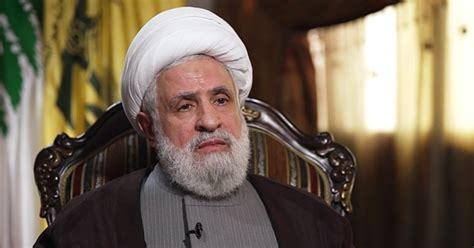
As Hezbollah awaits Israeli retaliation, its second-in-command insists they are not seeking war
Iran-backed Hezbollah is determined not to ramp up its monthslong firefight over Lebanon’s southern border, but will respond in kind to any Israeli escalation, the political party and militia’s second-in-command told NBC News in a rare and exclusive interview.
Naim Qassem faulted Israel and the United States for perpetuating tit-for-tat attacks that have killed hundreds in southern Lebanon and displaced tens of thousands of civilians on both sides of the Israeli-Lebanese border. The conflict started with Hamas’ terror attack on Israel on Oct. 7, which killed more than 1,200 people and sparked Israel’s bloody incursion into the Gaza Strip that has since killed nearly 34,000 people, according to the Ministry of Health in Hamas-ruled Gaza.
“We didn’t expect the war would last this long because we didn’t think that Netanyahu was that foolish, same for Biden and the other countries,” Qassem said, as Israel’s two-front conflict drags into its seventh month.
As Hezbollah’s deputy secretary-general, Qassem ranks second behind the group’s revered leader, Hassan Nasrallah.
Qassem’s comments came as Israel prepares its response to an unprecedented retaliatory Iranian missile and drone barrage against the Jewish state — an impending reprisal that would bring the Middle East closer to a region-wide war than at any time in recent memory.
But the latest round of fighting between Israel and Hezbollah began months before last weekend’s direct confrontation between Israel and Iran. Hezbollah is estimated to have upward of 150,000 rockets and missiles, in addition to drones and anti-tank, anti-aircraft and anti-ship missiles, according to a Reuters report, citing data from the CIA.
Hezbollah, a powerful, Iran-backed Shia political party and militant organization, was formed in the early 1980s during the Lebanese civil war and was an active force during the Israeli occupation of southern Lebanon, when it set a mission to expel Israeli forces from the country. The group has long claimed solidarity with the Palestinian cause. The U.S. considers Hezbollah a terrorist organization.
Hezbollah first struck a disputed border region of northern Israel on Oct. 8, the day after Hamas’ attack on Israel. At the time, Hezbollah called that strike an act of “solidarity” with Hamas. Iran also has backed Hamas for years.
Hezbollah claimed responsibility Wednesday for a missile and drone attack on northern Israel that injured 18 people, 14 of whom were Israeli soldiers, saying the strikes were retaliation for Israel killing two of the group’s commanders in a cross-border attack the day before.
Among the multiple Iran-backed groups that oppose Israel in the Middle East, Hezbollah is by far the strongest and the largest beneficiary of Iranian largesse.
Iran has declared that its attack Saturday night, which saw it launch more than 300 missiles and drones at Israel, marked the full extent of its retaliation for an April 1 strike by Israel on the Iranian Consulate in Syria’s capital, Damascus, that killed two senior commanders and five advisers from Iran’s Islamic Revolutionary Guard Corps.
Qassem said Iran repeated its public messaging to Hezbollah.
“Tehran speaks publicly and clearly. They do not want war and they have responded to the attack on their embassy and that’s it for them,” Qassem said. “I think Iran is honest. This is what they told us and this is what they keep reiterating to the media.”
Qassem offered measured criticism of the three Arab countries — Jordan, Saudi Arabia and the United Arab Emirates — that assisted in Israel’s defense against the Iranian salvo Saturday night.
“It wasn’t adequate for any Arab nation to support Israel no matter what justifications they had,” he said. “Their populations will hold them accountable for all those who took this decision.”
Qassem laid equal blame for the civilian losses in Gaza on both Israel and the United States, dismissing a recent public rift between U.S. President Joe Biden and Israeli Prime Minister Benjamin Netanyahu as little more than cosmetic politics meant to “safeguard America’s image.”
“I consider that Biden and Netanyahu are both complicit in one scheme with very minor differences,” Qassem said.
In an earlier interview in November, Qassem told NBC News that Hezbollah would push more forcefully into its fight with Israel if the Jewish state continued its incursion into Gaza.
But nearly six months later, both Hezbollah and Israel have mostly hewed to “rules of engagement” — an unstated understanding between both sides that has so far tempered the fighting and confined it to the two states’ border regions.
“We will not accept that the Israelis transgress the rules of engagement that are currently set in the south” of Lebanon, he said. “If the Israelis increase their attacks, we will increase our attacks as well.”
While Israel is playing by the rules of engagement for now, senior Israeli officials have threatened to destroy Lebanon if Hezbollah escalates.
In January, an assassination by drone strike in Beirut of a Hamas leader was believed to have been carried out by Israel, ratcheting up tensions then, though Israel did not claim responsibility.
Despite its limited engagement, Qassem said Hezbollah’s fight is “serving its purpose” by “luring the Israeli forces to get busy in the north,” referring to their shared border, rather than Gaza, which borders southern Israel.
“Therefore, we will continue to do so, and we will not wage a full-scale war unless the Israelis decide to get into war against us,” he said. “Then we are ready for the full confrontation.”
Source » msn.com





